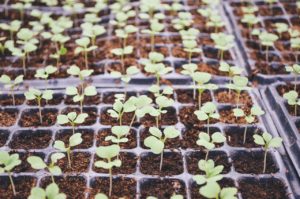 Celebrating Koinonia Farm’s 75th Birthday
Celebrating Koinonia Farm’s 75th Birthday
Two UVA students recently attended the Clarence Jordan Symposium at Koinonia Farm, an event focused on honoring Jordan by increasing peace, community, and racial justice in the world today. Megan Helbling and Isabella Hall traveled down together with the support of the Project on Lived Theology.
Isabella was curious about sustainable agriculture and the methodology, struggles, and successes of different intentional communities. Interested in exploring the role of the church in social reform and conciliatory communication, Megan learned about the legacy of housing and economic justice created by Koinonia affiliates. Both women were able to meet notable activists from mainstream Protestantism and heard notable Christian activists and thinkers, including Jonathan Wilson Hartgrove, Shane Claiborne, William Barber, and Ruby Sales.
Reflecting on the stories of Koinonia workers, Megan stated:
“While inspired by the life of Clarence Jordan, I am reticent to idolize him because the narrative of Koinonia often prioritizes Jordan’s biography over the women and African Americans who labored alongside him. Since the voices of those marginalized actors often go unheard, this conference unexpectedly was an opportunity to celebrate the folks who often aren’t honored in the usual telling of this history…The speaking style that most of the highlighted speakers adopted the form of storytelling, whether about their own intentional communities, their experiences in peace movements, or formative interactions with Jordan or Koinonia. Coming from the environment of UVA, this
gave us an opportunity to consider new ways of learning that are different from the academic lectures to which we’ve grown accustomed. Storytelling, we realized, is a much more relational and distinctly communal form of learning and sharing knowledge. It represents a more peaceful, less assertive style of instruction, as it doesn’t assume that all knowledge manifests itself into different lives, communities, or cultures the same way. Rather, it offers one isolated example of the ways that one person encountered different lessons or themes, and invites the listener to extrapolate their own meaning or application for the story into their own lives.”
Isabella was interested in comparing her experience living in the Perkins House at UVA to the experience of living at Koinonia Farms, as well as being able to reflect on the Civil Rights Movement through the people she met:
“Without a doubt, the people we encountered were my favorite piece about the Clarence Jordan Symposium. From Mennonite Pastors Sarah Thompson and Joanna Shenk, to our new friend Gabriel, a current Koinonia resident, and finally, founding Koinonia members themselves. Physically inhabiting the same spaces which served as battleground for ethnic and economic justice during the Freedom Movement was impactful. I couldn’t help but be reminded on Charles Marsh’s notion of the American South as Theological Drama and indeed, we had entered into enfleshed theological drama. For instance, the symposium was hosted at the very Methodist and Baptist Churches which excommunicated Jordan and his Koinonia flock years ago. The church doors which were once unconditionally closed to Black Americans now hosted a symposium committed to racial reconciliation and strategizing for combat against systemic racism. Attending the conference was important for both Megan and I in order to understand how our own justice- work and theological experiences are situated within a broader narrative, that is, the unfinished business of the Civil Rights Movement.”
For more information on Koinonia Farm, click here.
Fellow travelers are scholars, activists, and practitioners that embody the ideals and commitments of the Project on Lived Theology. We admire their work and are grateful to be walking alongside them in the development and dissemination of Lived Theology.
